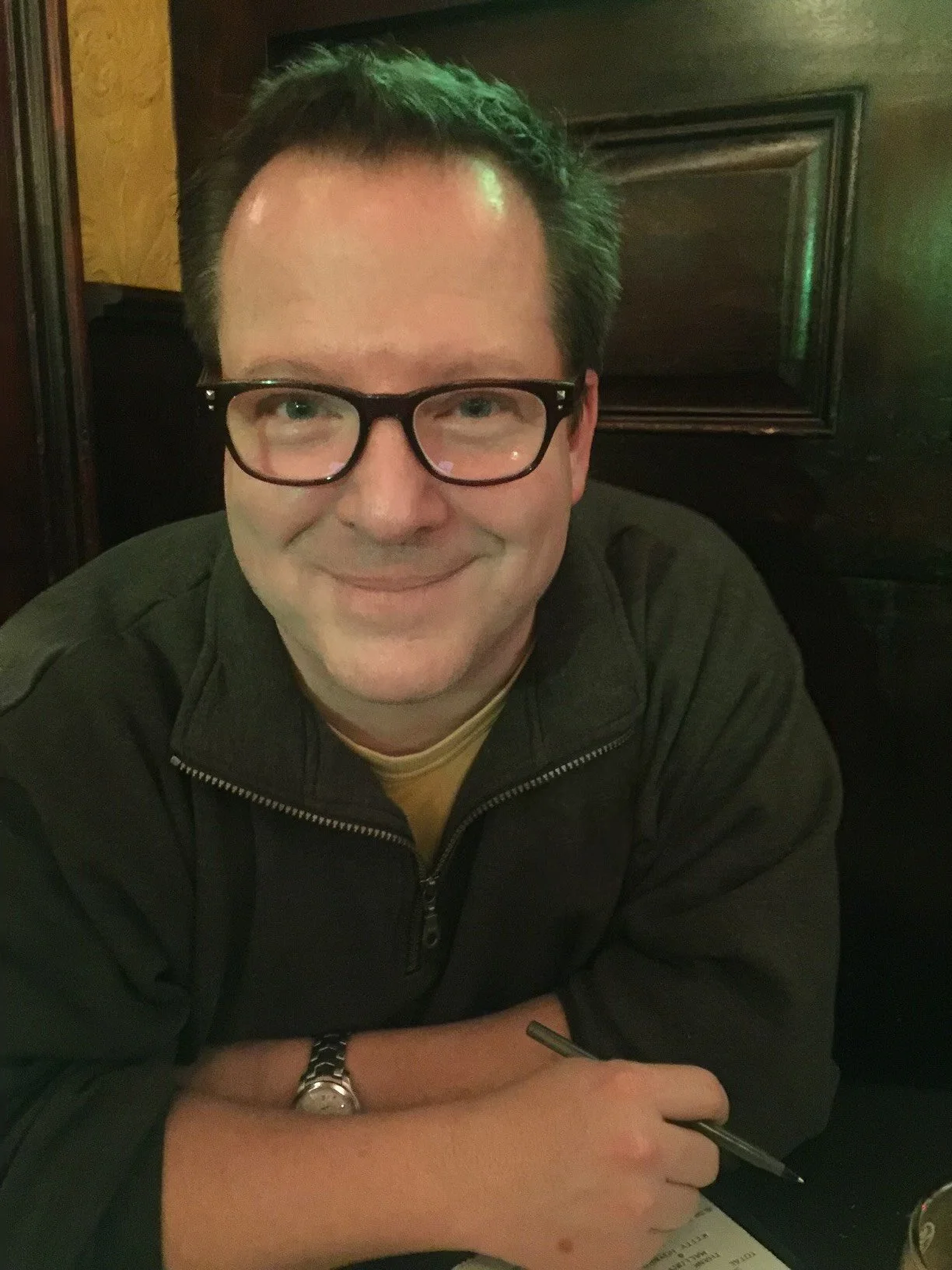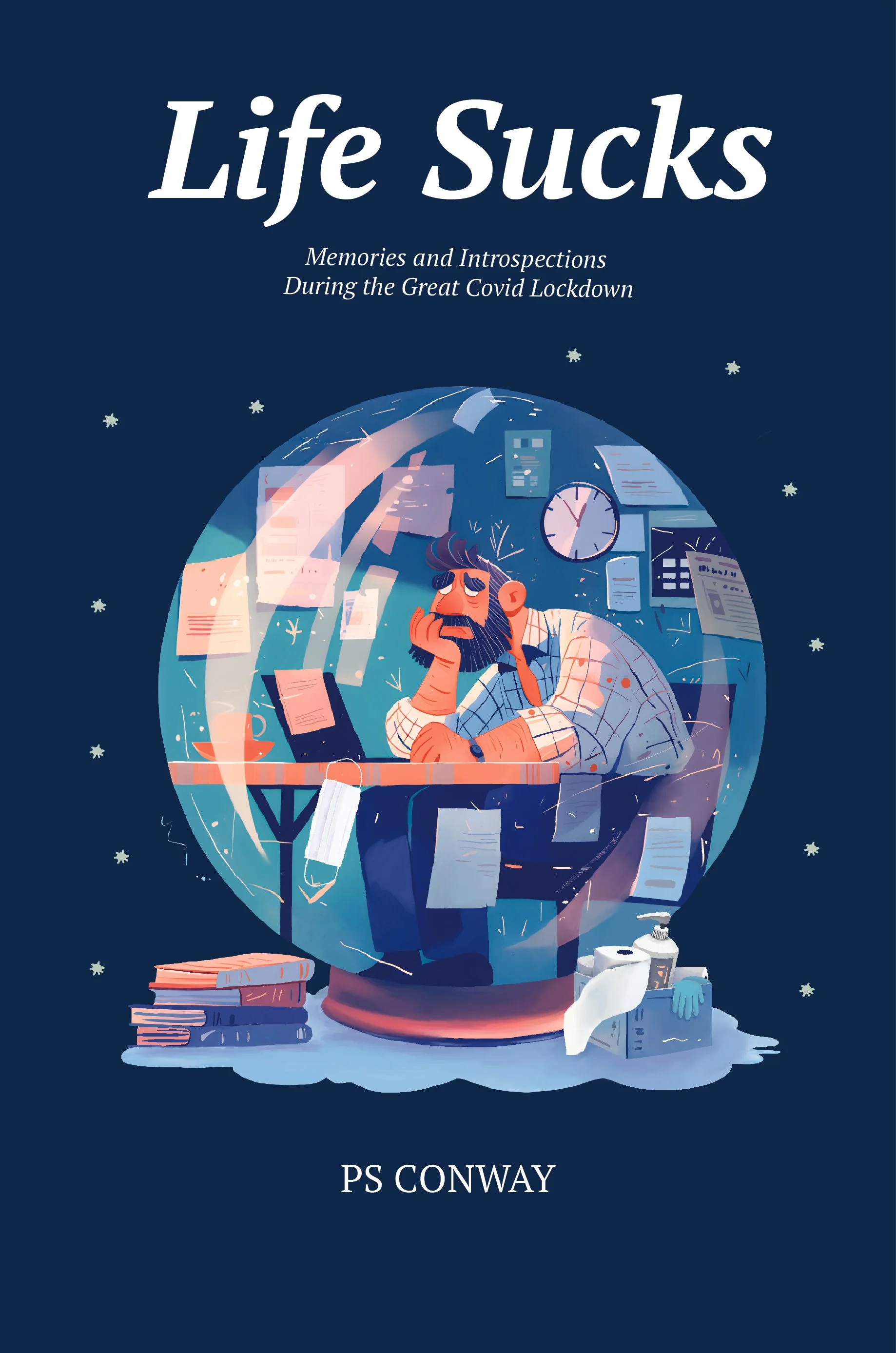Q&A with PS Conway, Life Sucks: Memories and Introspections During the Great Covid Lockdown
/What made you decide to document the lockdown in this way—through essays soaked in satire and cynicism?
The lockdown didn’t feel like a chapter in a memoir. It felt like a fever dream that needed to be exorcised in real time. Essays soaked in satire and cynicism were my way of screaming into the void while hitting it in the face with a pie. The world had turned absurd, and writing straight wouldn’t cut it. I wasn’t trying to document history. I was trying to survive it with my sanity (mostly) intact. Satire gave me a pressure valve. My cynical voice gave me a shield. And together, they let me say the kinds of things I couldn’t admit in a grocery store, whispering “Rosebud” in the mango aisle, without getting arrested.
You describe your style as “literary comedic nihilism.” How did that voice evolve during the lockdown, and did it surprise even you?
People have always told me I’m funny, sometimes a little childish, sometimes just absurd, but in the lockdown, literary comedic nihilism came out of nowhere like a late-night infomercial. I invented this new subgenre of Humor for the book because, honestly, there was no other way to make sense of what was happening. With LCN, you learn a little, laugh a lot, and then forget about it all - because it never really mattered anyway. It was the perfect fit for surviving a pandemic: find a truth in the chaos, toss it in a blender with some laughs, and hit “purée.” Who needs meaning or truth when facts are now just science’s opinions?
These essays originated on your blog Life Sucks. Laugh Here. What made you decide to gather them into a book? And why now?
The essays didn’t exactly ask to be a book. They kind of elbowed their way in. Life Sucks Laugh Here started as a way to cope with the absurdity of the 2020 lockdown. There was nostalgia, social commentary, politics, and, yes, some truly absurd bits (hello, Moby's Dick). But it wasn’t just about the chaos of COVID or the insanity of that time. It was about laughing at all of it. And why now? Well, I never thought it possible, but half the U.S. seems to have gotten more selfish and stupid since lockdown. And with Trump still hanging around like an angry, orange dingleberry that refused to drop, it felt like the right moment to refresh these essays. Can you spell “sequel”?
Your reflections skew toward the absurd, but there’s truth and sharp insight underneath. What role do you think satire plays in helping us cope—or confront—societal dysfunction?
Society is a trainwreck. We’re one power failure away from cannibalism. Satire is the fire extinguisher for the dumpster fire we’re living in. It doesn’t fix anything, but it makes life’s burnt marshmallows a little easier to stomach. Satire lets us laugh at things that are too messed up to face directly, because if we didn’t, we’d be hoarding toilet paper for the next apocalypse. Society itself is an illusion — a false construct built to control the mob with bread and circuses. Satire pulls back the curtain, showing us the absurdity while we’re too busy laughing at the clown. It’s not about ignoring the chaos. It’s about laughing so hard at it that you forget to be terrified, and for a moment, you realize: we’re all just part of the same Big Top culture.
You take shots at everything from politics to “Manopause.” Was anything off-limits for you when writing these essays?
Off-limits? Pfft. There were no sacred cows. Only the excoriation of those lowing in the fields of conformity. If something felt untouchable, it was probably the first thing I aimed for. Politics, aging, idiocy, nothing was safe. The one thing I didn’t make light of was the 1,100,000+ Americans who died during COVID. Many unnecessarily. That was my line in the sand. But I didn’t hold back when it came to the "Covidiots" who defied every protocol, questioned vaccines, and made the rest of us pay for their selfishness. Those people? Brutal death wished upon them, figuratively, of course. Kinda.
How do you balance dark humor with emotional resonance without tipping too far into either?
Balancing dark humor with emotional resonance is like juggling chainsaws while riding a unicycle. Lean too far into the dark, and you’ll drop a chainsaw straight into the tire and break your neck. Go too light, and you end up juggling rubber chickens - awkward, pointless. No one’s impressed. The trick is knowing when to toss a sharp one and when to let the weight of the moment hang there, like talking over each other on Zoom during your lockdown Thanksgiving dinner. If you make someone laugh and then feel uncomfortable about it, you’ve nailed it. If not, well, you’re probably just going to need better insurance.
Fans of Seinfeld and observational humor will feel right at home in your work. Who are your humor or literary heroes?
While I’m flattered by some comparisons to Jonathan Swift and Dennis Miller, I’m also heavily influenced by the weird, the dark, and the absurd. Seinfeld, for example, is the gold standard for finding comedy in the mundane, like dealing with the aftermath of "Soup Nazis" or becoming "master of my domain." In literature, Vonnegut’s dark humor and Orwell’s sharp, allegorical insights are huge influences. Both tackle the bleakest parts of humanity with humor, yet depth. If a piece of writing can make you laugh and think, then it’s doing its job.
About Life Sucks: Memories and Introspections During the Great Covid Lockdown
Discover PS Conway's deeply cynical yet comedic reflections on the Great COVID Lockdown in this collection of satirical essays, perfect for fans of Seinfeld's humor about "nothing" and skeptics of society's enduring absurdities.
What happens when a poet with a darkly literate soul turns his attention to the absurdity of a global pandemic? You get PS Conway's unique brand of "literary comedic nihilism." Written during 40 weeks of lockdown, this unapologetically irreverent collection of essays is more relevant now than ever. Originally shared on his (now-defunct) blog, "Life Sucks. Laugh Here," Conway's essays serve as both a nostalgic reflection on a "troubling period in history" and a cautionary tale about society's cyclical absurdity.
A two-time Pushcart Nominee, Conway is the author of over 50 poems published across journals and anthologies, including two Amazon Best Sellers. He released his first poetry collection, Echoes Lost in Stars, in March 2024 to critical acclaim. With Life Sucks, Conway brings his trademark wit and dark humor to the page. From the existential significance of a colonoscopy to that of baseball and the overlooked reality of "Manopause," he fearlessly skewers lockdown life, politics, and the human condition.
By the time you finish Life Sucks, you'll understand what Conway meant when he wrote, "My intention was for readers to learn a little, laugh a lot, and then forget about it all, because none of it ever really mattered anyway. The good news? It happened before, and it'll happen again. You never had to worry. Ever. Facts are just science's opinions."
Buy Amazon Kindle | Paperback | Bookshop.org
















































